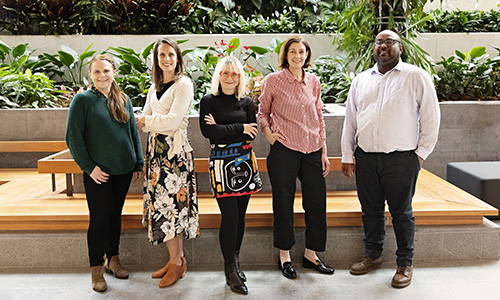AusHSI at HSR24
 Presented by the Health Services Research Association of Australia & New Zealand, the 13th Health Services Research Conference runs from 4–6 December at the Royal International Convention Centre in Brisbane. The Australian Centre for Health Services Innovation, together with the UQ Centre for Health Services Research, are proud sponsors of the event.
Presented by the Health Services Research Association of Australia & New Zealand, the 13th Health Services Research Conference runs from 4–6 December at the Royal International Convention Centre in Brisbane. The Australian Centre for Health Services Innovation, together with the UQ Centre for Health Services Research, are proud sponsors of the event.
This year’s conference theme is Health Services Research in the Digital Age, highlighting the complexity of integrating digital innovations within health systems. AusHSI’s digital health researchers work closely with our health system counterparts to study the nature of these problems, conducting diverse research across two overlapping disciplines, implementation science and health economics.
Implementation science integrates cutting-edge systems thinking with pragmatic strategies, solutions and tools to address challenges in adopting, optimising and sustaining appropriate digital health innovations. Health economics provides a structured approach to evaluate the costs, benefits, and overall value of implementing digital health technologies to improve efficiency, equity, and health outcomes.
Featured throughout the HSR24 program, the AusHSI implementation science, health economics and statistics & data analysis teams will showcase diverse research across several talks over the 3 days of the conference.
HSR24 Program Highlights
Wednesday 4 December
11am–12.15am | Hall B, Symposium 1
Using consumer and community engagement to maximise the value, uptake and sustainability of research (while watching out for traps in the digital age)
Featuring presentations by A/Prof Zephanie Tyack, Dr Bridget Abell and Pakhi Sharma
11am | Meeting Room 4, Session 1E Healthcare Implementation
Adapting implementation theory to support pragmatic co-design of informatics demand management processes in a large metropolitan health service.
Presented by Dr Sunny Naicker
3.55pm | Meeting Room 3, Session 3D Capacity Building and Education
The effectiveness and cost-consequences of a multi-component hospital avoidance program in 11 residential aged care homes: results from a stepped-wedge cluster randomised trial
Presented by Dr Hannah Carter
Thursday 5 December
9am–10.30am & 11am | Hall B, Plenary Session 2
Featuring invited speakers Prof Melissa Baysari, Prof Sarah Larkins and Dr Fiona Russo, chaired by A/Prof Zephanie Tyack
Panel Discussion: Consumer and Community Involvement in Digital Health Services Research
3.30pm–4.45pm | Meeting room 2, Session 6C Cutting edge Methods and Meta Research
Non-publication bias in clinical prediction modelling and the role of health services research
Presented by Dr Nicole White
Development and collective case study of the Cost-IS (costing implementation strategies) instrument for digital health solutions
Presented by Thomasina Donovan
Friday 6 December
9.15am–10.15am | Hall B, Plenary Session 3
Featuring invited speaker Prof Mike Drummond, chaired by Prof Steven McPhail
Economic evaluation for health care decision-making: are we ready for the digital age?
Fireside chat: Health Economics in the Digital Era
Be sure to download the HSR Conference App and search for speakers and sessions to create your own personalised program and ‘star’ your favourites. You can also view abstracts and connect with sponsors and exhibitors.
For more HSRAANZ conference updates and conversation, you can follow #HSR24 on Bluesky and LinkedIn.
In the lead up to this year’s conference theme Health Services Research in the Digital Age, we have been unpacking the value of digital health research and highlighting AusHSI’s work in this space.
Check out a new Talking HealthTech podcast episode featuring AusHSI Centre Director, Prof Steven McPhail, A/Prof Amina Tariq and Dr Sundresan Naicker. They discuss the state of digital health, misconceptions around predictive models and why a systems approach is key to driving meaningful healthtech innovation. Although advanced digital solutions such as AI offer considerable promise for improving patient healthcare and streamlining processes, they also come with challenges and need to be implemented thoughtfully and ethically.







